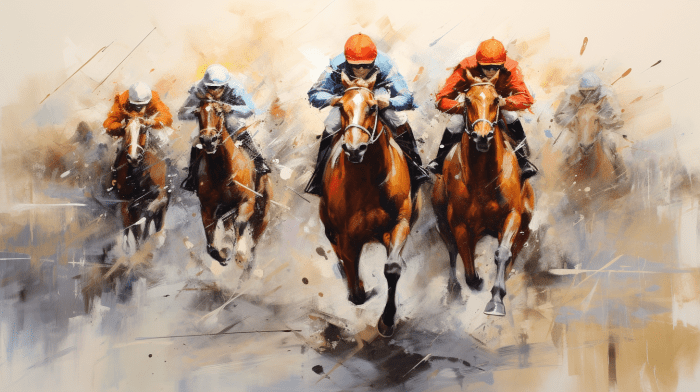3 Things to Do Before Placing a Horse Racing Bet
FTC Statement: Reviewers are frequently provided by the publisher/production company with a copy of the material being reviewed.The opinions published are solely those of the respective reviewers and may not reflect the opinions of CriticalBlast.com or its management.
As an Amazon Associate, we earn from qualifying purchases. (This is a legal requirement, as apparently some sites advertise for Amazon for free. Yes, that's sarcasm.)

If one's looking to dive into the exhilarating world of horse racing betting, consider a few critical steps before diving headfirst. It's not just about picking a horse with an attractive name or impressive stats; it requires strategy, knowledge, and careful consideration. The thrill of the game can quickly turn into disappointment if you're not adequately prepared.
A common misconception is that luck alone will secure a win – that couldn't be further from the truth. Successful horse racing betting involves analyzing factors such as track conditions, jockey form, and even the horse's mood on race day. It's about making informed decisions based on facts and figures rather than relying solely on chance.
Before placing their first bet, anyone should ensure they've done their homework thoroughly. They'll need to understand how odds work, study previous race results carefully, and get familiar with the different types of bets available. These crucial steps will increase their chances of turning an enjoyable pastime into a profitable hobby.
Calculate Your Potential Winnings
Before they dive into the exhilarating world of horse racing betting, bettors must understand how to calculate their potential winnings. Bettors can calculate the winnings themselves, or can take advantage of online betting calculators such as those found at Lucky 15 Tips’ website, which makes the job a lot easier. This way, they'll always know their possible return on investment.
Firstly, understanding the odds is a must. Odds represent the likelihood of an event - in this case, a certain horse winning the race. They're typically displayed as fractions (e.g., 3/1) or decimals (e.g., 4.00).
For fractional odds:
- If a bettor places a $10 wager at odds of 3/1 and wins, he'll receive $30 in winnings plus his original stake back.
- For decimal odds, multiply your stake by the decimal number to determine your total return, including your stake. So if you placed that same $10 bet at odds of 4.00, you'd get back $40.
Secondly, consider each-way bets. These are two bets: one on the horse winning outright and another on it placing (usually top three). Each part has an equal stake and can win independently from each other.
Finally, factor in potential bonuses offered by bookmakers, such as enhanced prices or 'best price guaranteed.' Paying attention to these offers is important as they can significantly increase potential returns.
Remember that while knowing how to calculate potential winnings is vital for successful betting strategies, there are no guarantees in horse racing – or any sport, for that matter! As thrilling as it may be when one's favorite steed gallops past the finish line first, every race has risks and rewards.
Know How Much You Can Spend
Before placing a bet on a horse race, it's crucial to determine how much you're willing and able to spend. This isn't simply about looking at the cash in your wallet or the balance in your bank account. It's about understanding your financial situation holistically and making sound decisions based on that.
Firstly, you must establish a budget. Setting aside an amount for betting ensures you won't dip into funds meant for other necessities like bills or groceries. Remember this rule of thumb: only bet what you can afford to lose. Gambling should be viewed as entertainment rather than an avenue for earning income.
Secondly, consider the price per bet. Horse racing bets vary greatly in cost depending on the type and complexity of the wager.
Lastly, remember potential losses when calculating how much you can spend. While winning is always exciting, losing is also part of gambling. Remembering this helps keep betting fun while preventing it from becoming financially destructive.
The key takeaway here? Understanding your budget before placing any bets plays a significant role in ensuring a positive horse racing experience.
Research the Racecourse and the Horses
Placing a bet on a horse racing event isn't just about luck but also strategy. One critical part of that strategy involves researching the racecourse and the horses involved.
One crucial detail everyone should consider when betting is the specific conditions of the race track. It's essential to know whether it's a flat or jump course, its length, and its surface type (grass, dirt, or synthetic). Each horse performs differently depending on these factors. For example, some are better on grass, while others excel on dirt tracks.
In addition, getting familiar with each participating horse's credentials can significantly increase your chances of making a successful bet. Key details you'd want to pay attention to include:
* The horse's recent performance history
* Its age and health status
* The jockey riding it
* The trainer behind it
The more information gathered about these variables, the better your odds of placing a winning bet.
Overall, doing your homework before placing any bets is an absolute must for anyone wanting to maximize their potential winnings in horse racing betting. Remember: knowledge is power when it comes to this game!


